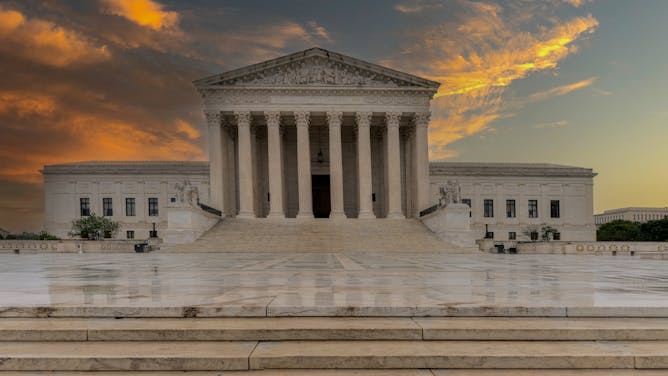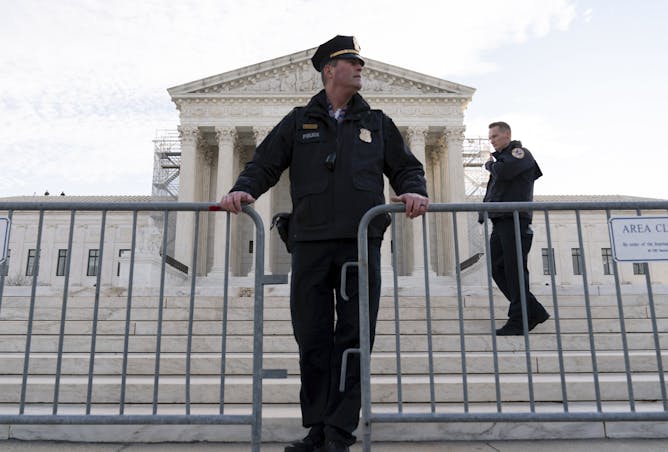|
|
|
|
Happy Sunday − and welcome to the best of The Conversation U.S. Here are a few of our recently published stories:
Legal issues involving former President Donald Trump dominated the news last week. And our crack politics team was all over them, with timely articles that provided readers with context, perspective and analysis from experienced political and legal scholars. It was hardly a surprise that two of the stories readers gravitated to most last week were about the two separate court cases that made big headlines – one with negative implications for Trump, the other potentially more favorable.
The first was a unanimous ruling by a federal appeals court panel that Trump is not immune from prosecution for crimes committed while president. Claire Wofford, a political scientist at the College of Charleston, explained the implications of the ruling, both for the current cases against Trump and all presidents, past, present and future. The case is expected to be appealed to the Supreme Court, which may choose to intervene or let the appeals court ruling stand.
The high court was where the week’s other big Trump news took place. The justices heard oral arguments over the Colorado Supreme Court’s decision to remove Trump from the ballot in the state because it determined Trump engaged in an insurrection on Jan. 6, 2021. Ahead of the U.S. Supreme Court hearing, political scientists Jessica A. Schoenherr of the University of South Carolina and Jonathan M. King of West Virginia University wrote about what was at stake for the court, notably its legitimacy as a nonpartisan body.
And following the hearing, senior politics editor Naomi Schalit interviewed Notre Dame election law scholar Derek T. Muller to learn what he gleaned from the justices’ questions. In the interview, which was one of last week’s editor picks, Muller explained why he felt the justices were skeptical that a single state should decide for the whole nation whether Trump is eligible to be president.
|

|
Bryan Keogh
Managing Editor
|
|
Readers' picks
|

The U.S. Supreme Court.
Larry Crain/iStock/Getty Images Plus
Jessica A. Schoenherr, University of South Carolina; Jonathan M. King, West Virginia University
With their upcoming decision concerning whether Donald Trump can appear on the Colorado ballot, Supreme Court justices face the possibility that the ruling could be ignored or defied by the public.
|
|
|
-
Claire Wofford, College of Charleston
Donald Trump has claimed he is immune from prosecution for actions he took as part of his job as president. An appeals court unanimously disagreed, allowing the many prosecutions of Trump to proceed.
-
Justin P. Klein, University of Delaware
Musk can’t dodge this ruling by moving Tesla’s incorporation to Texas.
-
Sara Harmouch, American University; Nakissa Jahanbani, United States Military Academy West Point
More than 85 locations linked to militias were hit in a robust response by Washington to an earlier deadly drone attack on a US base in Jordan.
-
Benjamin Case, Arizona State University
While the conflict between Hamas and Israel is unique, the case of South Africa’s border war – and subsequent fall of apartheid – might offer lessons that apply to the Middle East.
|
|
Editors' picks
|

Police place a fence at the U.S. Supreme Court on Feb. 8, 2024, before justices heard arguments over whether Donald Trump is ineligible for the 2024 ballot.
AP Photo/Jose Luis Magana
Derek T. Muller, University of Notre Dame
Partisan differences at the Supreme Court seemed to be set aside as conservative and liberal justices alike asserted concerns about giving states too much power over national elections.
|
|
|
-
Emily Hemendinger, University of Colorado Anschutz Medical Campus; Katie Suleta, George Washington University
Although most Americans believe dietary supplements are safe, these products often make health claims that are unproven or downright false.
-
Joseph Patrick Kelly, College of Charleston
During a campaign speech in South Carolina, President Biden made it clear that he is not only running against Donald Trump but also against white supremacy.
-
Sarah Damaske, Penn State; Adrianne Frech, Ohio University
Think the norm is to join the workforce straight after school, work for five decades and then retire? Think again.
-
Thaddeus Hoffmeister, University of Dayton
Jennifer Crumbley was found guilty for a school shooting committed by her son; the father faces trial next.
|
|
News Quiz 🧠
|
-
Fritz Holznagel, The Conversation
Test your knowledge with a weekly quiz drawn from some of our favorite stories. This week, questions on 🧧, 🎬 and 🎶🔵🎂
|
|
|
Like this newsletter? You might be interested in our other weekly emails: About The Conversation: We're a nonprofit news organization dedicated to helping academic experts share ideas with the public. We can give away our articles thanks to the help of foundations, universities and readers like you. Donate now to support research-based journalism
|
| |
| |
| |
| |
|
|
|
|
|
|
|